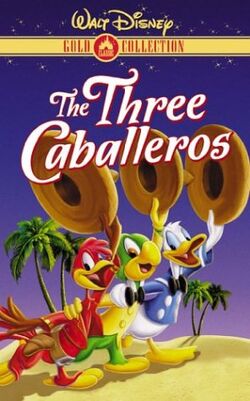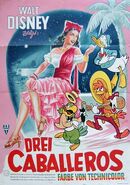| The Three Caballeros | |
|---|---|
 Original theatrical release poster | |
| Film information | |
| Directed by: | Norman Ferguson |
| Produced by: | Walt Disney |
| Written by: | Homer Brightman Ernest Terrazas Ralph Wright Roy Williams Harry Reeves Dick Huemer Joe Grant Ted Sears William Cottrell Webb Smith |
| Music by: | Edward Plumb Paul J. Smith Charles Wolcott |
| Studio: | Walt Disney Pictures |
| Distributed by: | RKO Radio Pictures Buena Vista Distribution |
| Release Date(s): | December 21, 1944 (Mexico) February 3, 1945 (USA) |
| Running time: | 72 minutes |
| Language: | English |
| Preceded by: | Saludos Amigos |
| Followed by: | Make Mine Music |
The Three Caballeros is a 1944 American animated musical film produced by Walt Disney Productions. The film premiered in Mexico City on December 21, 1944. It was released in the United States on February 3, 1945 and in the UK that March. The seventh animated feature in the Disney Animated Canon, as well as the first Disney canon to be a sequel (to Saludos Amigos), the film plots an adventure through parts of Latin America, combining live-action and animation. It is the second of the Disney package films of the 1940s.
The film is plotted as a series of self-contained segments, strung together by the device of Donald Duck opening birthday gifts from his Latin American friends. Several Latin American stars of the period appear, including singers Aurora Miranda (sister of Carman Miranda) and Dora Luz, as well as dancer Carmen Molina.
The film was produced as part of the studio's good will message for South America, but is less obviously propagandistic than others. The film again stars Donald Duck, who in the course of the film is joined by old friend José Carioca, the cigar-smoking parrot from Saludos Amigos, representing Brazil, and later makes a new friend in the persona of a pistol-packing rooster Panchito Pistoles, representing Mexico.
It was severely edited and re-released in featurette form on April 15, 1977 to accompany a re-issue of Never a Dull Moment.

The 3 Caballeros-Song (subtitled)
Plot
The film consists of several segments, connected by a common theme. In the film, it is Donald Duck's birthday, and he receives three presents from friends in Latin America. The first present is a film projector, which shows him a documentary on birds. During the documentary, he learns about the Aracuan Bird.
The next present is a book given to Donald by José Carioca himself. This book tells of Bahia, one of Brazil's 26 states. José shrinks them both down so that they can enter the book. Donald and José meet up with several of the locals, who start dancing. Donald ends up pining for one girl. After the journey, Donald and José leave the book.
Upon returning, Donald realizes that he is too small to open his third present. José shows Donald how to use magic to return himself to the proper size. After opening the present, he meets Panchito Pistoles, a native of Mexico. The three take the name "The Three Caballeros" and have a short celebration. Panchito then gives Donald's present, a piñata. Pancho tells Donald of the tradition behind the piñata. José and Panchito then blindfold Donald, and have him attempt to break open the piñata, which eventually reveal many surprises. The celebration ends with Donald Duck being fired away by firecrackers in the shape of a bull.
Throughout the film, the Aracuan Bird appears at random moments. He usually pesters everyone, sometimes stealing José's cigar. His most famous gag is when he re-routes the train by drawing new tracks. He returns later in Melody Time.
Film segments
The film's segments include:
- The Cold-Blooded Penguin involved a penguin named Pablo, reproducing images of the penguins of Punta Tombo in Argentina along the coast of Patagonia, "Pablo the penguin" is so fed up with the freezing conditions of the South Pole that he decides to leave for warmer climates.
- The Flying Gauchito: Tells the adventures of a little boy from Uruguay and his winged donkey, Burrito. It is believed the donkey is modeled after hefty Latin lover Don Juan De Gama.
- Baia: involves a pop-up book trip through Baia, the capital of the Brazilian state of Bahia, as Donald Duck and José Carioca meet up with some of the locals who dance a lively samba and Donald starts pining for one of the females, played by singer Aurora Miranda.
- Las Posadas: the story of a group of Mexican children who celebrated Christmas by re-enacting the journey of Mary and Saint Joseph, searching for room at an inn. "Posada" means "inn", and they are told "no posada" at each house until they come to one where they are offered shelter in a stable. This leads to festivities including the breaking of the piñata, which in turn leads to Donald Duck trying to break the piñata as well.
- Mexico: Pátzcuaro, Veracruz and Acapulco: Panchito gives Donald and José a tour of Mexico on a flying sarape. Several Mexican dances and songs are learned here. Donald seems to be a "wolf" to the ladies again, and tries to gain their affections, but fails.
- You Belong To My Heart: The skies of Mexico result in Donald falling in love with a singing woman. The lyrics in the song itself play parts in the scenarios as to what is happening as well.
- Donald's Surreal Reverie: A kiss, or several to be exact, lead to Donald going into the phrase "Love is a drug." This scene is similar to "Pink Elephants on Parade," for being a major "trippy" scene. Donald constantly envisions sugar rush colors, flowers, and Panchito and José popping in at the worst of moments. The scene changes after Donald manages to dance with a girl from the state of Oaxaca, from the Isthmus of Tehuantepec. The two dance to the song "La Sandunga." The girl begins by singing the song, with Donald "quacking" out the rest of the chorus. The "drunkness" slows down for a moment, but speeds up again when a Mexican girl uses a conductor's stick to make cacti do just about anything while dancing "Jesusita en Chihuahua", a Mexican Revolution trademark song. The scene is interrupted when Panchito and José spice things up, and Donald ends up battling a toy bull with wheels on its legs. The catch is that it's loaded with firecrackers and other explosives.
Production

Donald Duck with Jose Carioca and Panchito Pistoles in the end of the movie
Influence
The Agustín Lara's song "You Belong To My Heart" was featured in a Disney short called Pluto's Blue Note (1947). It was later recorded by Bing Crosby. The Ary Barroso's song "Baia" and the title song became popular hit tunes in the 1940s. The complete "Baia" sequence was cut from the 1977 theatrical reissue of the film.
Some clips from this film were used in the "Welcome to Rio" portion of the Mickey Mouse Disco music video.
Don Rosa wrote two sequels in 2000 and 2006. As of September 2006, Panchito and José Carioca, have returned at Walt Disney World where they used to appear for meet and greets. They can only be found outside the Mexico pavilion in World Showcase at Epcot. Donald also appears with them.
Cast and characters
- Clarence Nash - Donald Duck (also dubbed the Spanish and Portuguese versions)
- José Oliveira - José Carioca
- Joaquin Garay - Panchito Pistoles
- Aurora Miranda
- Carmen Molina
- Dora Luz
- Sterling Holloway - Narrator (The Cold-Blooded Penguin)
- Frank Graham - Narrator
- Fred Shields - Narrator
- Nestor Amarale
- Almirante
- Trío Calaveras
- Trío Ascencio del Río
- Padua Hills Player
- Carlos Ramírez (singing voice) - Mexico
Promo Gallery
Release
Critical response
The Three Caballeros received mixed reviews when it was released. In his book, The Magic Kingdom: Walt Disney and the American Way of Life, Steven Watts explains that most critics were relatively perplexed by "the technological razzle-dazzle" of the film, thinking that, in contrast to the previous feature films up to this time, it "displayed more flash than substance, more technique than artistry." Bosley Crowther for one wrote in The New York Times, "Dizzy Disney and his playmates have let their technical talents run wild." Other reviewers were taken aback by the sexual dynamics of the film, particularly the idea of Donald Duck lusting towards live-action women. As The New Yorker put it in a negative review of the film, such a concept "is one of those things that might disconcert less squeamish authorities than the Hays office. It might even be said that a sequence involving the duck, the young lady, and a long alley of animated cactus plants would probably be considered suggestive in a less innocent medium." Review aggregator website Rotten Tomatoes reports that 87% of the critics gave the film a positive review based on 15 reviews.
Television
For the film's television premiere, The Three Caballeros aired as the ninth episode of the first season of ABC's Disneyland television series. Edited, shortened, and re-titled A Present For Donald for this December 22, 1954, broadcast and subsequent re-runs, Donald receives gifts from his friends for Christmas, instead of for his birthday as in the original.
Theatrical re-release
The Three Caballeros was severely edited and re-released in featurette form on April 15, 1977, to accompany a re-issue of Never a Dull Moment.
Home video
- Main article: The Three Caballeros (video)
- 1982 (VHS and Beta)
- 1987 (VHS and Beta)
- October 28, 1994 (VHS and Laserdisc)
- 1995 (Laserdisc - Exclusive Archive Collection)
- May 2, 2000 (VHS and DVD)
- April 29, 2008 (DVD - Classic Caballeros Collection)
- June 14, 2016 (2-Movie Collection Blu-Ray/DVD Combo)
Other media
The Three Caballeros also appear in some of Disney's themed resorts, such as Disney's Coronado Springs Resort where one can find topiary of the trio, and Disney's All-Star Music Resort where a fountain depicting the trio is the centerpiece of the Guitar-shaped Calypso Pool.
In February 2001, José and Panchito appeared in several episodes of House of Mouse.
In April 2007, the film became the basis for a ride at the Mexican pavilion at Walt Disney World's Epcot named Gran Fiesta Tour Starring The Three Caballeros.[1]
Trivia
- During the titular song, when the line "we have the stars to guide us" is sung, Both José and Panchito's mouths are synched to the words, but only Panchito is singing the line. It is unknown if this was an error.
References
- ↑ Gran Fiesta Tour at Walt Disney World. WDWHistory.com.
| Previous Animated Feature: | Next Animated Feature: |
| Saludos Amigos | Make Mine Music |
| v - e - d | ||||||||||||
|---|---|---|---|---|---|---|---|---|---|---|---|---|
|
| This page uses content from the English Wikipedia. The original article was at The Three Caballeros. The list of authors can be seen in the page history. As with DisneyWiki and Disney Fan Fiction, the text of Wikipedia is available under the GNU Free Documentation License. |













